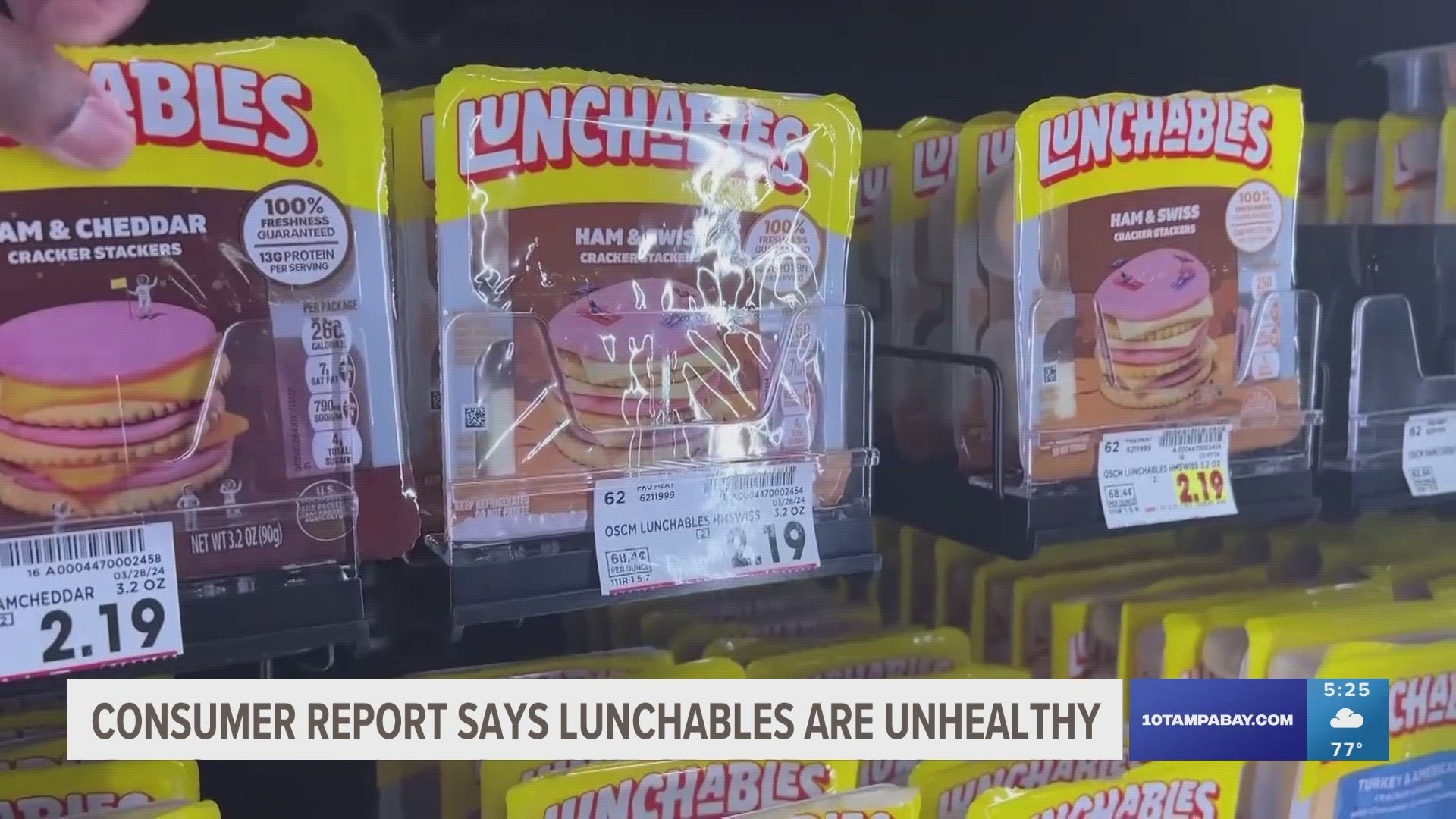WASHINGTON — Testing released by the nonprofit Consumer Reports has found elevated amounts of sodium, as well as relatively high levels of lead and cadmium, in Lunchables meal kits. The advocacy group is now urging the USDA to drop Lunchables from the National School Lunch Program, which feeds millions of students in the U.S.
Consumer Reports is a nonprofit that does research into consumer products to test for safety and performance.
In a new report on Lunchables, released Tuesday, the group says they found that the Lunchables given to students in schools have a higher amount of sodium than the versions available on store shelves.
Two Lunchables packages, a turkey and cheddar cracker meal and a cheese pizza, were made available to students through the National School Lunch Program last year, according to an archived page on the website of Lunchables manufacturer Kraft Heinz.
While sodium, or salt, is an essential part of a healthy diet, excessive sodium consumption has been linked to health problems such as high blood pressure, heart disease and an increased risk of stroke.
According to remarks from Kraft Heinz officials reported by The Guardian, the school lunch versions of Lunchables contain more protein and whole grains than the store-bought counterparts, but remain identical in other ways — including, according to Consumer Reports, the amount of lead.
The group says testing of 12 commercially available lunch packages, including several Lunchables products, found both lead and cadmium (a similar toxic metal) in the items. The three Lunchables kits tested the highest; all of them had at least 69% of California's maximum allowable dose level for lead, according to Consumer Reports.
While California has the lowest allowable lead threshold of any U.S. state, there are few federal guidelines limiting the amount of lead that can be in food.
Any amount of lead is considered extremely hazardous when consumed, especially by young children.
Lead consumption has been linked to a wide variety of health problems, with young children experiencing the worst effects because the metal affects them as they are still developing. Children exposed to lead have a higher risk of seizures, intellectual disabilities or behavioral disorders, among other conditions.
Consumer Reports also found that 11 of the 12 consumer lunch kits tested were positive for phthalates, plastic chemicals that have been linked to major health problems such as diabetes and certain cancers.
Because of their findings, Consumer Reports is urging the USDA to remove Lunchables from schools. The petition, available here, received more than 14,000 signatures within the first 24 hours after it launched.
“Lunchables are not a healthy option for kids and shouldn’t be allowed on the menu as part of the National School Lunch Program,” said Brian Ronholm, Consumer Reports' director of food policy, in a statement. “The Lunchables and similar lunch kits we tested contain concerning levels of sodium and harmful chemicals that can lead to serious health problems over time. The USDA should remove Lunchables from the National School Lunch Program and ensure that kids in schools have healthier options.”
In a statement provided to CBS News, a Kraft Heinz spokesperson defended the company's lunch products, but did not deny the presence of lead or high sodium values in the kits.
"Many of our Lunchables products are a good source of protein, offering nutrients through meats and cheeses. We've taken great steps to improve the nutrition profile of Lunchables, including ... reducing the sodium in all Lunchables crackers by 26%," the spokesperson told CBS News.
"According to current science, processed foods arbitrarily classified as 'ultra-processed' are not necessarily less nutritious. In fact, many processed foods contain added nutrients, providing even more benefits to the consumer. The classification of foods should be based on scientific evidence that includes an assessment of the nutritional value of the whole product, not restricted to one element such as a single ingredient or the level of processing."
Kraft Heinz did not immediately return an emailed request for comment about the report or the petition to remove Lunchables from the school meal program.

